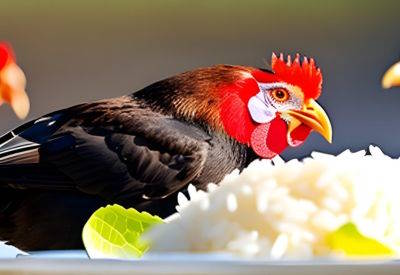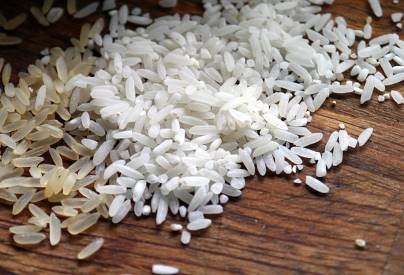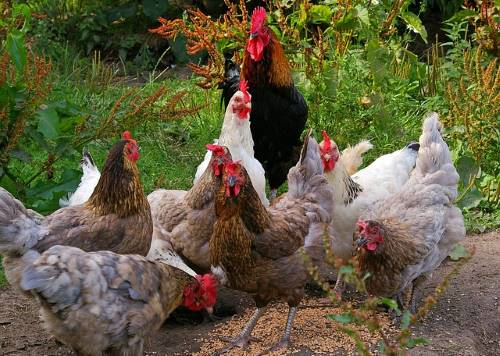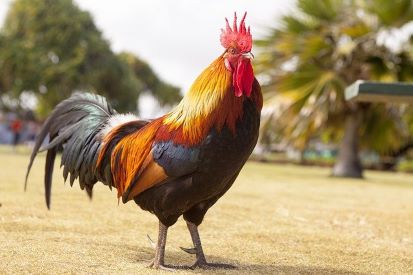As a fellow chicken enthusiast, I know how important it is to provide our feathered friends with a balanced diet. In our quest to keep our chickens happy and healthy, we often find conflicting information about what they can and can’t eat. Today, I will tackle a popular question: Can chickens eat rice?
In this article, we will explore the nutritional value of rice for chickens, discuss the potential benefits and risks of feeding rice to your flock, and offer some practical tips on safely incorporating rice into their diet. So, if you’re wondering whether your chickens can eat rice, you’ve come to the right place. Let’s dive in and uncover the truth about this common grain!

The Nutritional Value of Rice for Chickens
Before we go any further, let’s break down the nutritional content of rice and see what it has to offer our clucky companions. Rice comes in various types, such as white, brown, and others. Each type has a different nutritional profile, but for the sake of this article, we’ll focus on the most common types: white and brown rice.
White rice mostly comprises carbohydrates (around 80%), with small amounts of protein and fat. It also contains essential vitamins and minerals, such as B vitamins, iron, and manganese. Brown rice, on the other hand, is a whole grain that retains its bran and germ layers, providing more fiber, vitamins, and minerals than white rice.
Rice is relatively similar in macronutrient content to other grains commonly found in chicken feed, such as corn and wheat. However, brown rice has a slight edge in micronutrients due to its whole-grain status.
[ChickenAffiliate]
Benefits of Feeding Rice to Chickens
Now that we understand rice’s nutritional value better, let’s explore the potential benefits of including it in our chickens’ diet.
Aiding digestion and gut health
Cooked rice is easily digestible and can help maintain healthy gut function in chickens. The added fiber in brown rice can be particularly beneficial for digestive health.
Boosting energy levels
Rice is a rich carbohydrate source, providing energy for your chickens. This can be especially important during colder months when they need extra energy to maintain their body temperature.
Encouraging natural foraging behavior
Chickens enjoy scratching and pecking at food, and scattering cooked rice on the ground can encourage this natural behavior, making them happier and more active.
Economical and sustainable feeding option
Rice is an affordable grain that can be easily sourced, making it a cost-effective and sustainable addition to your chickens’ diet.
Potential Risks and Downsides of Feeding Rice to Chickens

While rice can be a healthy addition to a chicken’s diet, there are potential risks and downsides.
Uncooked rice and potential digestive issues
Feeding uncooked rice to chickens can cause digestive problems, as the uncooked grains can expand in their stomach and cause discomfort. Always cook rice before feeding it to your birds.
Overfeeding rice leads to nutritional imbalances
Like any food, moderation is key. Overfeeding rice can lead to a nutritionally imbalanced diet, potentially causing health issues in your chickens.
Contamination and pesticide concerns
Some rice may be contaminated with heavy metals or pesticides. Always choose high-quality, organic rice when possible to minimize these risks.
Tips for Safely Feeding Rice to Chickens

With the potential risks in mind, let’s discuss safely incorporating rice into your chickens’ diet.
Cooking rice properly before feeding
Always cook rice thoroughly before offering it to your chickens. This will ensure that the grains are soft and easy for them to digest. Ensure to avoid adding salt, oil, or seasonings, as these can harm your birds.
Mixing rice with other nutritious ingredients
To create a balanced meal for your chickens, consider mixing cooked rice with other healthy ingredients like vegetables, fruits, or high-quality chicken feed. This will provide a diverse range of nutrients and keep your chickens engaged at mealtime.
Portion control and moderation
As with any food, it’s important not to overfeed your chickens with rice. Offer rice as an occasional treat or supplement, ensuring it doesn’t make up more than 10-15% of their overall diet.
Ensuring a balanced diet through diverse feed options
To keep your chickens in tip-top shape, ensure they have access to various feed options. This should include high-quality, nutritionally balanced chicken feed, fresh greens, and occasional treats like cooked rice.
Storing and Preparing Rice for Your Chickens

Now that we’ve covered the ins and outs of feeding rice to chickens and explored other nutritious food options let’s discuss how to properly store and prepare rice for your flock. Following these guidelines will help ensure that the rice you feed your chickens is fresh, safe, and suitable for consumption.
Storing Rice
- Choose a cool, dry, and dark storage area: Rice should be stored in a cool, dry place away from direct sunlight to maintain its quality and prevent the growth of mold or bacteria.
- Use airtight containers: Storing rice in airtight containers will protect it from moisture, pests, and contaminants, keeping it fresh and safe for your chickens.
- Rotate your rice supply: To ensure you’re always feeding your chickens the freshest rice possible, practice the “first in, first out” method by using older rice before opening new packages.
Preparing Rice for Your Chickens
- Rinse the rice: Before cooking, rinse the rice thoroughly under cold running water to remove any dirt, debris, or potential contaminants.
- Cook the rice: Bring a pot of water to a boil, add the rinsed rice, and cook it according to the package instructions until it is soft and tender. Make sure not to add salt, oil, or seasonings during the cooking process, as these can harm your birds.
- Cool the rice: Allow the cooked rice to cool to room temperature before offering it to your chickens. Feeding hot rice could cause burns or discomfort.
- Combine with other healthy ingredients (optional): Mix the cooked rice with other nutritious foods, such as vegetables, fruits, or grains, to create a balanced and diverse meal for your chickens.
Following these storage and preparation tips, you can ensure that the rice you feed your chickens is safe, fresh, and nutritious. Remember to always feed rice in moderation as part of a well-rounded diet; your chickens will be clucking with delight in no time!
Frequently Asked Questions about Chickens and Rice
Can chickens eat other grains like quinoa or barley?
Yes, chickens can eat a variety of grains, including quinoa and barley. Just like rice, these grains should be cooked and served in moderation as part of a balanced diet.
How often should I feed my chickens rice?
Rice can be fed as an occasional treat or supplement, making up no more than 10-15% of your chickens’ diet. You might offer it once or twice a week, depending on the other food sources available to your birds.
Can chicks eat rice as well?
Yes, chicks can eat rice. However, ensuring the rice is cooked and soft is essential, making it easy for them to digest. Remember to introduce rice gradually and prioritize a balanced chick starter feed as their primary food source.
What Other Foods Can Chickens Eat Apart from Rice?

While rice can be a great addition to your chickens’ diet, offering them a variety of other nutritious foods is essential to ensure they receive a well-rounded, balanced diet. In this section, we’ll explore five other food items your chickens can enjoy, each with unique benefits. Let’s delve into these tasty alternatives and learn why they’re an excellent choice for our clucky companions.
Beans
Beans are a fantastic source of protein, vitamins, and minerals for your chickens. Protein is essential for muscle growth and egg production, while vitamins and minerals contribute to overall health.
However, it’s crucial to remember that beans should always be cooked before feeding them to your flock, as raw beans contain a toxin called lectin, which can harm chickens. Boil or steam the beans until they are soft, and avoid adding any seasonings, as these can harm your birds.
Read More: Can Chickens Eat Beans? A Guide To Feeding Chickens Legumes
Oats
Oats are a fantastic addition to your chickens’ diet, providing an excellent source of fiber, vitamins, and minerals. The fiber content in oats helps support healthy digestion, while the B vitamins, iron, and zinc contribute to overall well-being.
You can offer your chickens rolled or whole oats to supplement their regular feed or an occasional treat. Avoid offering instant or flavored oats containing added sugars or artificial ingredients.
Read More: Can Chickens Eat Oats? A Guide To Feeding Oats To Your Flock
Quinoa
Quinoa is a protein-packed pseudo-grain containing essential amino acids, vitamins, and minerals. This nutrient-dense food can help support muscle growth, feather development, and egg production in your chickens.
As with other grains, cook quinoa thoroughly before offering it to your flock, and avoid adding seasonings or oils.
Read More: Can Chickens Eat Quinoa? The Superfood Boost Your Chickens Need
Lentils
Lentils are another protein-rich legume that can provide a nutritional boost to your chickens’ diet. They are also high in fiber and micronutrients like iron, manganese, and B vitamins. Like beans, lentils should always be cooked before being fed to your chickens, as raw lentils contain anti-nutrients that can harm your birds.
Simply boil or steam lentils until soft and offer them as an occasional treat or supplement to your chickens’ regular feed.
Read More: Can Chickens Eat Lentils? 5 Awesome Benefits
Chickpeas
Chickpeas, or garbanzo beans, are another legume packed with protein, fiber, vitamins, and minerals. They can support chickens’ healthy growth, egg production, and overall well-being.
Before feeding chickpeas to your chickens, cook them thoroughly, as raw chickpeas can be difficult for your birds to digest. Boil or steam the chickpeas until soft, and, like with other legumes and grains, avoid adding any seasonings or oils.
Read More: Can Chickens Eat Chickpeas? Benefits & Tips For A Healthy Flock
Incorporating a diverse range of healthy grains and legumes into your chickens’ diet can help support their overall health, happiness, and productivity. Always cook these foods properly and serve them in moderation to ensure a well-rounded, balanced diet for your feathered friends.
Can chickens eat rice – final thoughts
So there you have it, fellow chicken aficionados – the mystery of whether or not chickens can eat rice has been cracked! As we’ve discovered, rice can be a nutritious and beneficial addition to your flock’s diet when served cooked and in moderation. Remember to balance it with other wholesome grains, fruits, vegetables, and insects to keep your feathered friends clucking with delight.
Ultimately, our goal as chicken keepers is to provide our birds with the best possible care, including a well-rounded diet. So go ahead and dish out some cooked rice to your clucky companions, but always keep an eye on the big picture. With a little love, attention, and a diverse menu, your chickens will thrive and reward you with their charming personalities, not to mention those delicious, farm-fresh eggs.
Related Articles:
